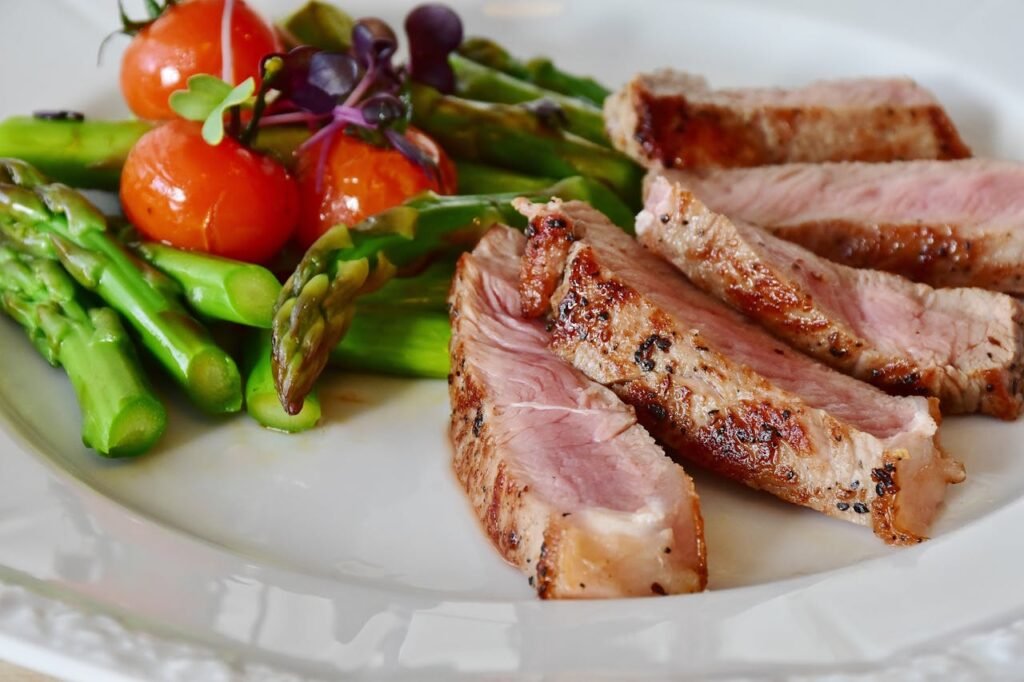
Building muscle requires more than just lifting weights. Proper nutrition plays a crucial role in supporting your strength training efforts. To maximize muscle gain, you need to fuel your body with the right nutrients. This guide will explain the essential components of a muscle-building diet, how to balance macronutrients, and tips for optimizing your nutrition for optimal results.
Understanding the Role of Nutrition in Muscle Gain
Why Nutrition Matters
Nutrition is fundamental for muscle growth and repair. Here’s why:
- Muscle Repair: Strength training creates tiny tears in muscle fibers. Nutrition helps repair and rebuild these fibers.
- Energy Supply: Proper nutrition provides the energy needed for intense workouts and recovery.
- Overall Health: A balanced diet supports general health, which is essential for effective training.
Key Nutrients for Muscle Growth
To support muscle gain, focus on these key nutrients:
- Proteins: Essential for muscle repair and growth.
- Carbohydrates: Provide energy for workouts and recovery.
- Fats: Support hormone production and overall health.
- Vitamins and Minerals: Aid in various bodily functions and support recovery.
Macronutrients for Muscle Gain
1. Proteins
Proteins are the building blocks of muscle. Adequate protein intake is crucial for muscle repair and growth.
- Recommended Intake: Aim for 1.2 to 2.2 grams of protein per kilogram of body weight daily.
- Sources:
- Lean Meats: Chicken, turkey, and beef.
- Fish: Salmon, tuna, and cod.
- Dairy: Greek yogurt, milk, and cheese.
- Plant-Based: Lentils, chickpeas, and tofu.
2. Carbohydrates
Carbohydrates are the primary energy source for high-intensity workouts. They also aid in muscle recovery.
- Recommended Intake: About 3 to 7 grams of carbohydrates per kilogram of body weight daily.
- Sources:
- Whole Grains: Brown rice, quinoa, and oats.
- Fruits: Apples, bananas, and berries.
- Vegetables: Sweet potatoes, spinach, and bell peppers.
- Legumes: Beans and peas.
3. Fats
Fats are essential for hormone production, including those involved in muscle growth.
- Recommended Intake: About 20 to 35% of your total daily calories.
- Sources:
- Healthy Oils: Olive oil, avocado oil, and coconut oil.
- Nuts and Seeds: Almonds, walnuts, and chia seeds.
- Fatty Fish: Salmon and mackerel.
- Avocados: Rich in monounsaturated fats.
Timing Your Nutritional Intake
1. Pre-Workout Nutrition
Eating the right foods before your workout can boost performance and energy levels.
- Timing: Eat a balanced meal 2-3 hours before training or a snack 30-60 minutes prior.
- Ideal Foods:
- Complex Carbohydrates: Oatmeal or whole grain toast.
- Protein: Greek yogurt or a protein shake.
- Healthy Fats: A small amount of nuts or seeds.
2. Post-Workout Nutrition
Post-workout nutrition is crucial for muscle recovery and growth.
- Timing: Consume a meal or snack within 30-60 minutes after exercising.
- Ideal Foods:
- Protein: Whey protein or a chicken breast.
- Carbohydrates: Sweet potatoes or brown rice.
- Hydration: Water or an electrolyte drink.
Hydration and Muscle Gain
Why Hydration Is Important
Proper hydration supports overall health and enhances workout performance.
- Muscle Function: Dehydration can impair muscle function and recovery.
- Energy Levels: Staying hydrated helps maintain energy levels during exercise.
- Recovery: Adequate water intake aids in nutrient transport and waste removal.
Tips for Staying Hydrated
- Drink Water Regularly: Aim for at least 8 glasses of water daily, more if you’re active.
- Monitor Urine Color: Light yellow indicates proper hydration, while dark yellow may suggest dehydration.
- Include Hydrating Foods: Eat fruits and vegetables with high water content, such as cucumbers and oranges.
Supplements for Muscle Gain
1. Protein Powders
Protein powders can help meet your daily protein needs, especially if you struggle to get enough through food.
- Types:
- Whey Protein: Fast-digesting and effective for muscle repair.
- Casein Protein: Slow-digesting, ideal for nighttime recovery.
- Plant-Based Protein: Suitable for vegetarians or those with dairy sensitivities.
2. Creatine
Creatine enhances strength, muscle mass, and exercise performance.
- Benefits:
- Increased Strength: Improves power and performance during high-intensity workouts.
- Muscle Growth: Helps in building muscle mass.
3. Branched-Chain Amino Acids (BCAAs)
BCAAs can reduce muscle soreness and enhance recovery.
- Types:
- Leucine: Stimulates muscle protein synthesis.
- Isoleucine: Helps with energy production.
- Valine: Supports muscle repair and growth.
Tips for Effective Muscle-Gaining Nutrition
1. Plan Your Meals
- Meal Prep: Plan and prepare meals ahead of time to ensure balanced nutrition.
- Balanced Plates: Include a source of protein, carbohydrates, and healthy fats in every meal.
2. Monitor Your Progress
- Track Intake: Use a food diary or app to track your macronutrient intake.
- Adjust as Needed: Make adjustments based on your progress and any changes in your goals or activity levels.
3. Consult a Professional
- Nutritionist or Dietitian: Seek advice from a professional to tailor your diet to your specific needs and goals.
- Personal Trainer: Work with a trainer to ensure your exercise routine complements your nutritional plan.
Conclusion: Fuel Your Body for Success
Proper nutrition is a key component of muscle gain and overall fitness. By focusing on a balanced intake of proteins, carbohydrates, and fats, and timing your meals effectively, you can support muscle growth and improve your strength training results.
Incorporate healthy eating habits, stay hydrated, and consider supplements if needed. With the right nutritional approach, you’ll be well on your way to achieving your muscle-building goals and enjoying the benefits of a stronger, healthier body.
Commit to fueling your body correctly and watch as your strength, performance, and overall well-being improve.

Leave a Reply